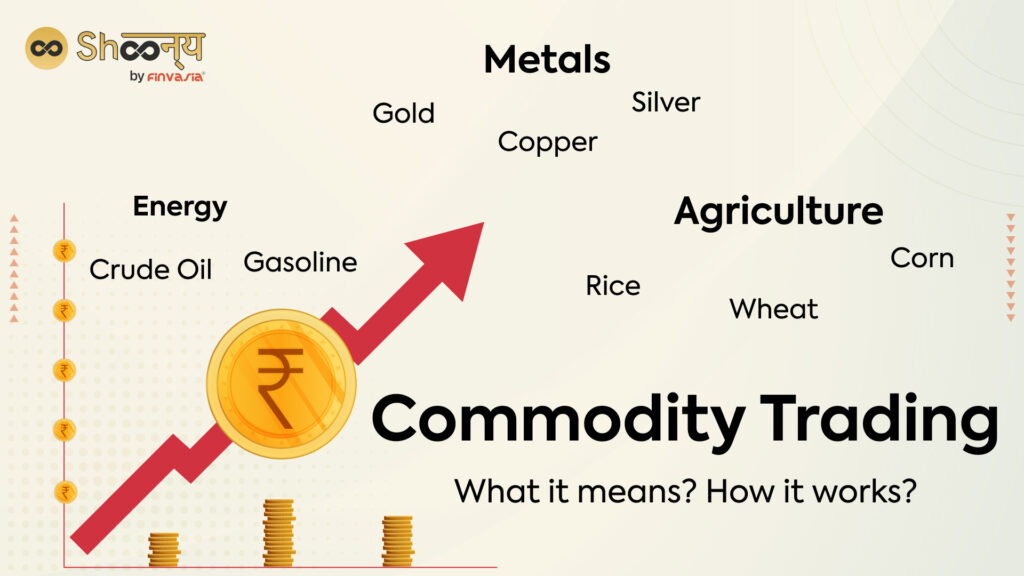Most people are unaware that, like crypto coins, stocks, and currency pairs, they can also comerciar materias primas digitalmente (trade commodities digitally).
As a part-time commodity investor, I believe it’s a much safer option than crypto or forex. The commodity market is less volatile than the crypto, stocks, or forex markets. However, as it’s also a type of trading, investing in commodities also carries a riesgo significativo (significant risk) and can wipe out your entire account if you’re not careful.
That said, why don’t I explain what commodity trading is, and explain some crucial factors to watch out for while you’re at it?
So, let’s start!
What is Commodity Trading?
Technically, commodity trading is the process of buying and selling items like wheat, barley, gold, silver, crude oil, and other raw materials. However, these commodities are further divided into different categories, such as:
- Agricultural Products: Corn, Wheat, Maize, Barley, Rice, etc.
- Metals: Gold, Silver, etc.
- Energies: Crude Oil, Natural Gas, Gasoline, etc.
- Livestock: Meat, Leather, Gelatin, etc.
These commodities are listed on the major financial markets worldwide. And, based on their fluctuating demand and supply, investors can predict the short or long-term performance of these products and buy or sell accordingly.
How to Trade Commodities?
Generally, you can trade commodities on Forex brokerage platforms like Exness, MetaTrader 5 (MT5), and others. However, unlike other types of trading, fundamental factors like political, economic, social, seasonality, etc, are significantly important in commodities trading.
Now, let’s explore how you can start commodities trading.
Choose a Digital Brokerage Platform
Keep in mind that commodities can be traded physically. But you have to go to a nearby commodities market to trade physically.
On the flipside, digital brokerage platforms effectively eliminate this requirement. Digital brokers like Exness and MT5 offer gráficos completos (comprehensive charts) of several commodities and let you initiate trades in seconds.
Having said that, whichever digital broker you choose, I believe it’ll be as good as your internet connection. Trading platforms require stable connectivity, and in the next heading, I’ll explain why.
Connect to a Reliable Internet Connection
One precondition of digital trading is top connectivity. Technical factors, such as indicators, charts, volume, and more, need to be updated in real time. Plus, not to mention that analytical tools like TradingView also need an internet connection to update data.
Personally, I’ve lost hundreds of dollars on a few trades that I did on outdated data. However, after switching to Optimum, a fiber connection with symmetrical speeds, I’ve always been able to stay up to the minute on the real-time pricing charts.
Additionally, I can always rely on Optimum servicio al cliente to find the nearest out-of-home Wi-Fi zones to trade on the go. So, considering all these factors, a reliable connection becomes incredibly important for commodities trading.
Keep an Eye on Economic Indicators
Supply and demand are two of the fundamental factors in the trading markets. Naturally, any asset, be it a currency, commodity, stock, or cryptocurrency, having greater demand but low supply is bound to reach new heights.
However, another major factor that influences commodity prices is estacionalidad (seasonality). For instance, the price of summer crops might plummet in winter and vice versa. Plus, natural disasters such as floods, tornadoes, hurricanes, etc, can also destroy crops and fields.
Moreover, the federal cuts, such as interest rates, can affect inflación en los mercados globales (inflation in the global markets).
So, all in all, such economic events are reflected in the commodities markets, and their prices can fluctuate accordingly.
3 Factors to Watch Out For
As I mentioned above, investing in the commodities market includes risk. However, you can minimize the risks by watching out for the following factors.
Market Sentiments and Speculations
Not just commodities, every trading market can be hijacked by insiders. Technically, insiders are people who spread speculations and create FOMO (Fear Of Missing Out) in the trader community.
They can spread fake news or share trading signals in the community. And most amateurs, without verifying the news or signals, hop on the bandwagon and suffer losses.
Global News and Events
As a commodity trader, you should always stay updated on major global news and events. Let me explain this with an example:
Ukraine is a major Wheat exporter globally, and its prices spiked after the conflict with Russia. Simply because the war damaged Ukraine’s production capabilities and created a Wheat shortage in the global markets.
So, commodity traders need to be aware of events happening around the world, as they notably fluctuate commodity prices.
Overtrading to Recover Losses
As a trader, it’s important to understand that not every trade will be profitable. Even a trade with sharp technical and fundamental analysis can end up in a loss.
However, more importantly, keep in mind that it’s not necessary to cover your loss straightaway. For me, this revenge trading is one of the biggest mistakes a trader makes.
It’s a fact that losses can cloud your ability to think clearly. And, with doubts in mind, there is a higher chance that you’ll suffer more losses.
So, whenever you suffer a loss, sit back, digest it, and analyze what went wrong. Only then, open the next trade and avoid revenge trading.
Frequently Asked Questions
What are hard commodities?
These are natural resources that are either drilled or mined, and cannot be grown, such as gold, silver, crude oil, etc.
What are soft commodities?
Instead of being extracted from drilling or mining, soft commodities are agricultural or dairy products like wheat, barley, cotton, meat, etc, which are grown on the Earth.
Is commodities trading risky?
Yes, any type of trading, be it crypto, stocks, forex, or commodities, includes financial risks.


